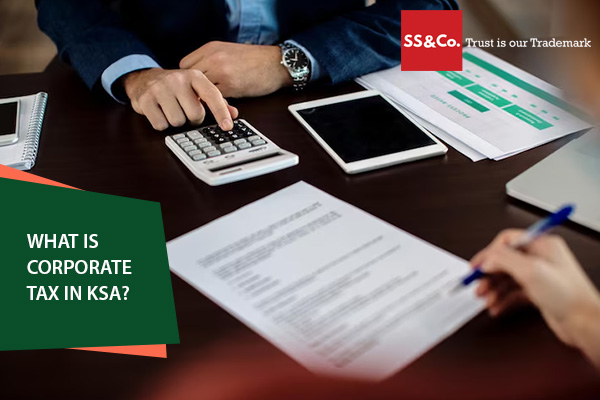What is Corporate Tax in KSA?

For any business operating in KSA, dealing with the critical taxation system is one of the core responsibilities. The multi-taxation system is full of rules and regulations to keep the businesses compliant and to gradually align the country with the international standards to attract global investors and boost the economic worth. One of the major taxes in Saudi Arabia is corporate tax, which is a direct tax mainly applied to the net profits of foreign-owned businesses and non-Saudi partners in Joint Ventures. As of now, the corporate income tax is charged at a fixed rate of 20%, as per the guidelines set by the Zakat, Tax and Customs Authority (ZATCA). This blog will further shed light on corporate tax, its eligibility criteria, rates, and benefits for the government and business.
Introduction to Corporate Tax in Saudi Arabia
The corporate tax system in Saudi Arabia was initiated to back the goal of expanding economic stability. Primarily, Saudi Arabia did not depend on taxes but on oil exports, which generated a considerable amount of revenue. However, over time, to evolve the country and make it stand out in the highly competitive global Market, the government decided to introduce a tax system. The corporate income tax was also a part of this plan; it was established in 2017 with a higher rate of 50% but was later reduced to 20% in 2020. This lower rate is must practical if compared with the high corporate tax rate in many countries, which has allowed the Kingdom to generate revenues by attracting foreign investments.
Corporations in KSA play a dual purpose as they not just facilitate the government in turning down the dependence on oil but also ensure that international entities and multinational corporation play their tax role fairly within the sector they operate. Corporate tax operates separately from Zakat, which is a religious obligation and only levied on Saudi and GCC nationals; instead, corporate tax targets the foreign investors, branches of international companies, and some specific sectors like oil and gas. It is mainly governed by the Zakat, Tax and Customs Authority (ZATCA), which issues rules, guidelines, and regulations from time to time to enforce and further modernize the corporate taxation system in KSA. Compliance with corporate tax is strictly mandated for businesses to ensure they are not just legally safe but also to support the economic strength of the country.
Who is Eligible to Pay Corporate Tax?
Corporate income tax in Saudi Arabia is applied to non-Saudi and non-GCC businesses that gain their income from business ventures within Saudi Arabia. This comprises companies that coordinate in Saudi Arabia with foreign ownership, along with the branch offices of foreign corporations. This tax system was shaped to make sure that all foreign businesses are incorporated in the Saudi economic market to facilitate the public finances. Corporate tax is aimed at the following entities:
- Resident Companies with Foreign Ownership: A company founded in KSA is exposed to CIT on its income assigned to international shareholders
- Non-Resident Companies with Permanent Establishment (PE): Any international business with a branch, office, or any source of presence in KSA is legally obliged to pay corporate tax on profits gained from Saudi Operations
- Certain Selected Sectors: Companies that take part in natural gas and hydrocarbon production are also mandated to pay a certain amount of taxes regardless of their ownership, and normally, this tax is higher than other sector rates.
- Mixed Ownership Companies: Businesses where ownership is shared among Saudi, GCC nationals, and foreign investors. The revenue is divided into two parts, and Zakat is applied to Saudi and GCC nationals, while corporate tax is applicable to foreign businesses.
Businesses that are managing any kind of business in KSA must have a full grasp of tax variance for CIT, Zakat, and a combination of both to stay protected from any misinterpretation that leads to compliance risks, penalties, and other legal hurdles.
Corporate Tax Rates and Sector-Specific Variations
Although the general corporate tax rate is 20% which is applied on the taxable income of foreigners, some sectors are prone to higher corporate tax rates due to their strategic importance, such as:
- Natural resources investment schemes are subject to a 30% corporate tax rate
- Oil and gas manufacturing is taxed at higher rates ranging from 50% to 85% as per the investment and profitability of a company. This is important to make sure that bigger industries share a fair part of their revenues from the costly natural resources.
Apart from these rates, KSA also imposes withholding tax (WHT) on the payments that are paid to non-residents, like royalties, dividends, technical services, and interest. It commonly varies from 5% to 20% and is oftentimes minimized under the double taxation treaties. Despite the fact that WHT is not a part of CIT yet, these rules, together with corporate taxation, overall impact the planning of taxes for multinational companies.
Benefits of Corporate Tax KSA
The corporate tax system in Saudi Arabia comes with multiple benefits, far from revenue generation, not just for the government but for businesses as well. Let’s further have a look at how it advances both.

For Government
- Revenue Diversification: Corporate income tax expands the revenue sources and creates a more stable financial system for public offerings. Corporate income sources were much more stable than those that depended on oil revenue, which faced the challenges of fluctuating oil prices.
- Funding Public Services and Infrastructure: The profits gathered from CIT are then utilized for infrastructure projects, healthcare, education, and developmental programs for the nation. This not only elevates the quality of life but also supports Vision 2030 goals.
- Building Financial Independence: By amplifying the tax base, KSA builds a tax system that is reliable enough to support the country independently without relying on oil, which pushes the economic growth
- Encouraging Compliance and Transparency: Corporate tax compliance demands that businesses document clear financial data using standardized formats with audited statements. This helps in creating an atmosphere of compliance and mitigates any informal economic activity
- Global Integration: The Saudi corporate tax treaties and transfer pricing rules align with OECD guidelines, which shows the Kingdom’s effort to position itself as an internationally competitive financial system.
For Businesses
- Balance and Stability: A specified rate of 20% helps the companies with proactive financial planning. The fluctuating prices, like oil rates or ad hoc levies, can cause panic, while CIT is stable, which allows companies to plan and budget accordingly
- Boosted Credibility and Clarity: The businesses that fully comply with the corporate tax regulations work on organizing financial statements and clear accounting practices. This opens new doors of opportunities for them as investors, who majorly rely on legally sound businesses.
- Better Legal Protections: A tax-compliant business gets the security of Saudi Laws, as their presence is regulated and acknowledged. This motivates a better investment environment and lessens the risks that come with informality
- Facilitation in International Operations: KSA simplifies the taxation system for businesses operating in multiple countries, as it has signed various double taxation agreements (DTAs) with other regions. These treaties help businesses to avoid being taxed twice on the same income, which lowers the tax load.
- Encouraging Equitability: With the right compliance with corporate tax, every investor equally takes part in the economy. This system guards against any unfair practices that have resulted from the avoidance of tax
Corporate Tax Compliance and Filing Requirements
Corporate tax compliance is a complete step-by-step methodology presented by Zakat, Tax and Customs Authority (ZATCA). Businesses must have a complete familiarity with these specifications to avoid any legal obstacles. The core requirements include:
- All the taxable businesses must register on the ZATCA portal for corporate tax filings and to get the recent changes notifications
- They must file the tax as per their tax year, which is generally January-December, except for special approvals in some cases, which allow a different financial year
- All businesses eligible for corporate tax must file their tax returns to ZATCA within 120days after the end of the fiscal year
- Companies generating profits above SAR 3 million must submit their audited financial statement, which must be assembled as per Saudi accounting demands
- If the tax liability exceeds SAR 500,000, then businesses are required to make payments in advance by dividing it into equal installments that they can pay throughout the year
- Severe legal penalties are imposed if a business files late for corporate tax, underreports its taxes, or fails to pay. These fines can range from 5% to 25% of the unpaid tax, including the added fines for further delays
Companies must make all the arrangements to ensure that they are fully compliant with the corporate tax KSA. They must hire expert tax employees, use advanced tools, and train their existing teams. If they find corporate tax critical to manage in-house, they must go for outsourced tax consultants; they will not just take care of all of their compliance matters but will also integrate the best tools to streamline the routine financial procedures, which will be beneficial for the authorities in making better decisions and smart budgeting as well.
Get Expert Tax Support Now!
Tax weightiness must not hinder your business operations. Reach out to SS&CO for skilled supervision of your corporate taxes in Saudi Arabia. Be it tax planning, registration, computation, or filing, we do it all with full expertise and a promise to keep your business on the compliance track and help you achieve your dreams without any legal stumbling blocks along the way.

